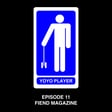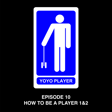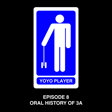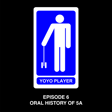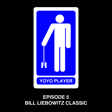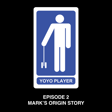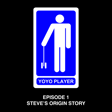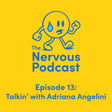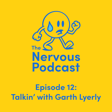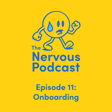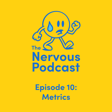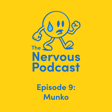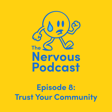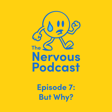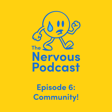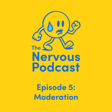Become a Creator today!Start creating today - Share your story with the world!
Start for free
00:00:00
00:00:01

Behold: The Yonomicon!
Steve and Mark talk through the history of The Yonomicon, the most feared, inspiring, and confusing book in the history of yoyoing. Original released almost 20 years ago, a newly revised edition is now available at Yonomicon.com!
This episode brought to you by YoYoExpert.com.
Theme music is "Runaway" by Reconciler.
Recommended
Transcript
Introduction and Meeting
00:00:12
Speaker
never
00:00:17
Speaker
say
00:00:29
Speaker
I'm Steve. And I'm Mark. And this is YoYo Player, a podcast where two dusty old yo-yo guys talk about dusty old yo-yo shit. Oh, so dusty. So old. So dusty. I was out in your neck of the woods recently and it was good to catch up in person. And it's true. It was a nice little break for me. I needed to just sort of get out and get away for a bit. And it was great kind of having a chance to sit down and chat with you. about, you know, just about like random stuff from our shared history. Yeah.
Re-release News and Challenges
00:01:05
Speaker
And you dropped some news on me that I was not expecting. I mean, I was kind of it. Well, I take it back. I was expecting it, but I was expecting it like two or three years ago, and then it never happened. And then now it's finally happening. My inheritance from the National Institute of Martian Research? No, the the actual rerelease of the updated version of the Onomicon.
00:01:30
Speaker
It's true. It's true. It's happening. it's It's happening. So a couple of years ago, you reached out and wanted me to write a new forward for it because you had like a publisher and everything who was like interested in like re-releasing it. I mean, this was like pre-pandemic, right? Oh, yeah. So like pre-pandemic or maybe pandemic. Or maybe, yeah, pandemic. yeah Early pandemic. Early pandemic. So you actually had a publisher that was like, yeah, let's do this. And they threw me a few bucks to like write a new forward for the book and everything. They threw you a few bucks because I told them to. Yeah. like Which is fantastic. I was like, I know how this goes. There is a 50-50 chance at best that you guys are going to come through.
00:02:11
Speaker
So I am going to just start getting as big of a deposit and as many of my friends on this train as possible ahead of time. That's the way to do it. Yeah. So yes, but. But then it didn't happen. It didn't happen. In the world of publishing, like shit like this happens, right? Like a book gets picked up and then for whatever reason, it just never quite crosses the finish line. But since you still own the rights and everything, you've decided to just throw caution to the wind. It's true. You release it yourself. It's true. It is going to be released by myself and that was, and that was not an accident. I kind of went into it with that attitude. Yeah.
00:02:52
Speaker
I think that maybe a lot of people don't even know what this book is. Maybe we should start at the beginning.
Yo-Yo History and Onomicon's Origins
00:02:57
Speaker
That's all. This is a history podcast. right Right. Well, but I mean, and that's the thing is, is I wanted to give a little bit of like modern context as to why we were talking about this now, but I gotta be honest with you, man, this is one of the weirdest pieces of quote unquote modern yo-yo history. This was very much a product of a very specific time in yo-yoing when all of us were like struggling to figure out how to explain this new thing that we were doing. Yeah. And you have always been, I don't want to call it like the armchair philosopher because that sounds like you haven't done anything. You were doing plenty. You're like in the thick of it and everything, but you were always sort of like that.
00:03:37
Speaker
I'm going to say this because I feel like it makes sense for you and your vibe. And I don't want it to sound insulting, but you're like a nickel and dime philosopher. You're like, Oh, Steve, you're so kind to think that I have both a nickel and a dime. You're you're full on like, you know, like working man, like budget philosophy, like every, every day. Yeah. Like everyday philosophy. And so, and so what I hate those ivory tower fuckers. I'm just saying. right Right. But like, so what you did with this is you took the approach of like ah an outsider artist, except that it's like an outsider, like mathematician, and created your own weird ass awkward math to explain yo-yo tricks, and then wrote a whole book that is very Mark McBride.
00:04:21
Speaker
about how that works. And I remember it's one of those things that it exists. I seriously still to this day, like, I mean, there, there was a significant number of copies that were printed and distributed and everybody was very excited about it at the moment that it came out. And I, I still to this day have only talked to like maybe five or six people who have read it cover to cover and understood it. Well, I mean, it is a reference book, so it's not exactly a cover to cover read. But ah again, I think you're very kind to give me five people. I mean, it's very hard for me to kind of talk about this without coming off as like sort of snarky or fucking pithy about it. But it's still to my mind stands as one of the weirdest and most
Industry Evolution and Transaxle Yo-Yos
00:05:10
Speaker
wholly fucking unique artifacts of that moment in yo-yo history.
00:05:16
Speaker
Oh, well, let's get into it. Let's get into that moment in yo-yo history. So I'm going to explain ah what this book is in my own words. And then I would like you to re-explain it as you meant it to be. And let's, let's start with the, when, when, when are we talking about in yo-yo history? Was this pre-warp tour or post? This is very pre, this is 1997. 97, okay. I mean, that's not very, that's only two years, but... Yeah, but it still is. Right after I left Tallahassee, before you even started working for Team Losi, before I started working for U omega. Right. So yeah, I started working for Team Losi in like late 98, late 98, early 99. What year did you move out to California? 97. 97, okay. So this was the year that you moved out. This is, you know already...
00:06:04
Speaker
It was the first half of 98. Excuse me. Here's the thing. I remember you sending me and I still have them somewhere. I remember you sending me all red, do not photocopy like yeah copies of it for review. And I remember you physically mailing those to me. So this was definitely after you, you moved to LA. Okay. So this is how, this is how old this is. All red paper was the original DRM. yeah So, okay. So for people who don't know, basically like if you wanted to send somebody a physical paper copy of something, but you didn't want them making copies of it for anybody else, you would print those copies on like kind of dark red paper so that it wouldn't photocopy. Yeah. So let's do a little history lesson here. In the life of McBride, I had, again, you and I were in talent, like working for Greg Cohen, yeah Tallahassee, and this is the,
00:06:59
Speaker
Would've been like 95, 96 era. This is when Spintastics, Dale Oliver had started Spintastics. yeah And this was before THP hit. Now at this point in history. Like THP was starting to happen in like 97, 98. Exactly. Because what was happening was that Bandai was picking up yoyos. They were starting to get inertia. Arne Dixon left. Yo Meg, excuse me, left Duncan to go start SuperYo. He saw it coming. Now, here's the thing is I think, I think your timing is just off on this because I think THP was going before you and I were really that aware of it. No, it was, it was. i said ninety At 97 Worlds in Pittsburgh,
00:07:47
Speaker
Thp was there like that. The kids were there. They were already good. They were competing. Yeah. Well, don't forget that thp was a store comp a store. Yeah. High performance. kind And then it became like the marketing arm of Bandai. Right. So high performance kites and Honolulu was the name of the store. And then it was thp is team high performance. Yeah. So this is before the big boom transaxle yo yo's yo mega was the Like you had Tom Coon had the silver bullet and roller woody, those kinds of like bearing yoyos. And then you Omega had the fireball and the brain. And what was happening was that this wasn't pre boom though. This was during the boom. yeah like So like 90, 97, 98 was like the height of it. Cause 99 is when it crashed. No, that's what I'm saying. So what happened was that,
00:08:40
Speaker
the context of like yo-yo play transaxles were starting to become a thing so mid 90s they were like yo-mega was out they were being promoted by thp but it was just japan before bandi picked it up 98 99 so people were watching it come in now this is important because greg as an industry guy was you know seeing it coming again. Dale Oliver was seeing it coming. They knew that this stuff was about to happen. They saw that it was happening in Japan. Just to clarify, it was Bandai in Japan. I think what what you're talking about is is the moment when Bandai US got on the train.
00:09:22
Speaker
Yeah, and then that was when that was when we started to see all of the actual US promotion, which yeah, to be honest, like started, I mean, that kind of started happening at the tail end, like the rest of the world sort of got it first, and then the US got it last and and big, you know, pretty big, not as big as Japan, but pretty damn big. And then then it collapsed. Yeah. No, it went Japan, US world kind of thing. But quite because at this point in history, yo-yo play was just the the new, the new fangled fast transaxle yo-yos were starting to get promoted. Yeah. This was, this was the rise of what we consider now to be modern yo-yo play. This was like the the inception, the very, like the kind of the very beginning when it started, when it was starting to creep out again, you and I had just been working at this little shop.
00:10:11
Speaker
Up till now like only museum and kite shops had these special cool yo-yos and the guys who were kind of in the industry knew that it was about to happen. Now that's important because Greg knew that and said, this is about to be a thing. So he did what what nobody else was doing, which is he started a web page, a magazine, and a book. Yeah, he was going to do the information and that was smart. And so the magazine was Fiend Magazine. the The website was yo-yoing.com and the book was the Yonah Akan. So I had been working again, like
00:10:57
Speaker
you know, we'd all been working together. I had just left and moved out to LA to be a movie guy. Yeah. And side note, side note, how many of your friends moved out to LA to be a movie guy
Mark's Career and Artistic Vision
00:11:11
Speaker
and got their first gigs working in adult film? Um, actually somebody that we'll be talking about in another episode, my buddy Brent, it was,
00:11:25
Speaker
What about Mark Nelson? Didn't Mark Nelson have a camera gig? No, you're thinking of Brent. I'm thinking of Brent, yeah yeah. But again, we're getting ahead of ourselves. He was scarred. Getting ahead of ourselves. so did you Did you ever have like adult gigs when you first went out there and were like scrambling for credits?
00:11:45
Speaker
I don't think so. Nothing on set. I worked i work security at a soft core convention, like a pin up, a pin up, like, you know, like, what did they call it? It was, there was some, some euphemism, but it was all like pin up girls just, so it was South of porno, but it was all these like guys who were showing up to like get autographs for girls that would never be their girlfriends. Yeah. So, um, but so at this point I'm sitting, sitting in my little studio apartment on Venice beach.
00:12:25
Speaker
Um, I was, you know, writing, writing screenplays, cause that's all you could do at that point. Well, that's, that's the dream, right? As you move out to LA and you just sit around writing screenplays and then you try and sell one. Exactly. Yeah. And so Greg calls me up because we're still in touch. We're all still friendly. And he says, Hey, check it out. Yo-yos are going to become a thing. So I'm going to start a magazine, a website, and a and I need to publish a book. I got a i got a publisher lined up to publish a yo-yo book. You used to always shoot your mouth off that there's no good yo-yo books. Now's your chance to write one.
00:13:04
Speaker
And I went, and there weren't, I mean, in fairness, there was a little flimsy like Duncan trick book. There was like a couple of crappy little pamphlet kind of books that were like included with other yo-yos. But I mean, there wasn't shit for you. There wasn't, there wasn't. In fact, that was, um, yeah, this story, these stories actually show up in the book. So, um, I feel bad almost like telling them twice, but hey. Here's another piece of context here. This was at a point, this is pre YouTube. Yeah, this is many is a decade before YouTube. So yo yo players were still interested in trick books. We sold that physical Duncan yo yo trick book hand over fist at the store because VHS tapes were expensive and not everybody had a fucking VCR.
00:13:58
Speaker
I mean, here's the thing you buy like, you know, the the Dunkin' Trick book was $2.99. So, bam. And it was more tricks than most people are going to ever be able to get through, because again, Imperial. So. It was fine. like The Dunkin' Trick book was great for 1977, but it did not keep up with Transaxle Yo-Yos. Which is hilarious considering I think that book was written in the 80s. So I did shoot my mouth off a lot, and this shows up in the book, in the original version. there's a I did one concept page that was like, If I could do a yo-yo book, this is what it'd be like. And I used an art of an alien because again, it's the nineties, like alien workshop, that skate company, like the joke of the little, the, the little great aliens and Chuck, there was a, you know, you lived with Chuck, he was a good friend and he was into that crap. And so, well, and you did the, this was the early 40 watt halo. Yeah. So 40 watt halo started off as you and I making t-shirt designs to sell at juggling conventions.
00:15:04
Speaker
Yeah, and it's and so it was in the very first one was the seeing is believing t-shirt, which was Yeah, it was an, I don't remember that one. Yeah. It was a little alien dude juggling yes like a hundred balls. Yes. I remember that one. It was like this. Yeah. alien He's a little alien dude juggling like 17 balls and like a weird cross Mills mess pattern behind his back. And it said seeing is believing. And that was the very first 40 watt halo t-shirt. We had him printed locally in Tallahassee and we sold them at Greg's booth at juggling conventions and people went nuts for it.
00:15:41
Speaker
Wow. I totally forgot about that. Man, you're telling me about art that I did. Yeah. so so So, and that's where it left off, you know, like, and then again, moved to l LA, Greg is Greg's like, okay, now it's time. And I went, okay, cool. Let's dig it out. Let's do it. I got, so that same alien character was, was part of your original like proof of concept art for the Unama con. Yeah, exactly. I think. Now I really want to go back and look at that art and make sure that I'm not crazy. I'm sure that you
Mathematical Approach to Yo-Yo Tricks
00:16:15
Speaker
reuse the same dude because, you know, this is at the point in time when like drawing this stuff in, you weren't even using an illustrator. You're using like macro media freehand probably. Oh, it was vastly superior than illustrator. Yeah. I'm still, I was still so mad when they discontinued, when, when macro media died, man, I loved using freehand. Oh, such a better program. Yeah. So I was like, okay, so we're just going to do, we're going to do a trick book.
00:16:41
Speaker
of the advanced tricks. Like Greg you know had said, start at brain twister and go forward. and so that was pretty i mean That was pretty smart for the time. like when you yeah you know i mean that was That was smart of him to recognize, don't bother trying to capture the beginner market. That's not who this is for. No. There were no tricks. The only trick was Again, I think Brain Twister showed up in that book and split the atom. So okay so let me let me provide a little context here. So what you mean when you say that is that this was not a trick book in the traditional sense of here are instructions on how to perform this trick. It started that way though. It started that way, but what it ended up being is something so much fucking weirder and so much more. Yeah. Mark McBride. It became a cookbook. Yeah.
00:17:33
Speaker
that taught you how to build and explain your tricks. This was the time in history where we were going from fixed axle tricks where you had to do it and you had like a short amount of time. So it was do, do, do and out. And that was like, voila, you rocked the baby. Good job. But now we were like, Oh, you could do that trick and then still have time to transition into another trick and transition to another trick. Yeah. We were, we were basically going from like, we were going from like the Ramones to like, Jam bands that was the difference in trick construction like it was really yeah you know it was like move move out and then it was like move move move move move move regen move move move move regen move move move out so the moves became the thing so we had a fixed set of These moves that we were kind of re they were showing up and recombining into all these you know these other tricks that we were doing so I started trying to record them and
00:18:28
Speaker
because again, you got to record them to like just simply inventory them to do an outline for the book. Right. At the time there was still, it hadn't quite blown up yet. No, like there and there really was still, it's so weird to think about this. When you and I started yo-yoing, there were a finite number of yo-yo tricks. Yeah. And you can go them all. And I remember us sitting down and writing them all down. Like I i remember like years later, and it's gone now, but I remember like you and I sitting there with a notebook and writing down every single yo-yo trick that existed that anybody we knew of knew about.
00:19:06
Speaker
I don't remember that, but I believe you. and so that was like um so Just as a way to inventory them, I started to have to come up with a way to record them. and then i start it so It became a matter of, the um I said, how are they you what's unique kind of thing? and It became, and so the what was unique was I realized that um at any point, if you stop a yoyo trick, you've got three points, two hands and a yoyo. And the string always starts at one hand and ends at the yoyo. So you could write, by trip pi tracing the path of the string, you could write you could like notate
00:19:58
Speaker
any any specific, like the smallest unique piece of a trick, which was a triangle. And so that became what we called quantum yield theory. The idea that every trick could be broken down. that was That was the unit, the quantum that you could break down any trick into, which was a bunch of triangles. And every change is just changing from one triangle to another. Bam. It's important to note that even just in this brief rudimentary explanation of what eventually became TFY notation, you've already lost me.
00:20:33
Speaker
How is how is this that we're already into epic we're already a minute 22 of this frickin episode Yeah, I hope this gets edited down and when I said that it's like replaced with like a different number because this is ridiculous No, I mean this is Yeah, this is the nature of this unfortunately is that history is complicated and weird and And honestly all of this, you know ridiculous like supporting detail that seems trivial to us It's important to record all this because let's be honest, like you and I are not going to be around forever.
Preserving Yo-Yo Knowledge
00:21:09
Speaker
And we're certainly not going to be around in any context where we're going to want to talk about this shit forever. You're so kind to think that people want this recorded to listen to it in the future. I mean, somewhere out there, there is some nerd who's like, the origin of the onomicon. My God.
00:21:27
Speaker
ah So so that so that became the book was what started out as what started out as like supposed to be a recipe like a trick book of like Bam Bam Bam Bam. I went Oh, this is a fundamental idea. We could just do this now this gave rise to What was ultimately my goal? the exciting part of the thing for me for this book was the idea that there could be a periodic table where you could map every like every yoyo trick you could show would show up on this map somewhere. And like you could find tricks mathematically. like The idea is that you could lay this out and be like, no one's ever gone from here to here to here, but it should be possible. You are the most sober stoner I have ever known in my life. I mean, it is truly, like there is nothing that you cannot overcomplicate.
00:22:25
Speaker
But how fucking cool is that? but i love like I love that Greg Cohen was like, Mark, I want you to write an advanced trick book. And you're like, I'll do you one better. And then what you delivered is like the densest, most complicated fucking concept imaginable. And then Greg looked at it and went, fuck yeah, let's do this. Oh, it's so cute that you think that anybody even understood it before we published it. No. We publish that book without understanding it. I know that because there are errors in the first printing that we corrected in the second printing. I mean i i distinctly remember like you sending me like advanced copies on like the red paper as as though I was going to make copies and distribute them. like Let's just stop and enjoy the idea that I was like,
00:23:18
Speaker
Steve, listen, I'm going to be really careful about this. I'm going to send you on this special paper because what I do not want you to do is photocopy my weird math book and share it with other people who are similarly not going to understand it at all. I'm just saying you could have left it somewhere and somebody could have stolen it from you because it was that important and then distribute it without you knowing. The amount of self-importance that we created for ourselves in our youth was just staggering. It was brilliant. It was amazing. It felt really good. But when you were sending me those copies, I specifically remember giving you the feedback, like, this seems really cool and all, but I don't know what the fuck it's supposed to mean. Yeah, there what it was. And I knew that. And I went, well,
00:24:07
Speaker
it makes sense to me and it is, it it is put down for for the record. And it's funny, even in the, even in the introduction of the book, I'm like, yeah, everyone reading this is just going to skip to like the sixth or seventh, whatever chapter where I break down a bunch of tricks and then they're going to only go back and hit the reference so that they could like reinterpret the tricks. And I'm just like, and that's, yeah, that's what it is. And that's fine. That's Jim Dandy, you know, But it is interesting. We've got a Discord server for Caribou Lodge and we've got a channel where people talk through like trick construction, right?
Learning and Terminology Evolution
00:24:42
Speaker
Yeah. And very, very often somebody will say like, Oh, I'm having a hard time with this trick. And then the response is always, Oh, I can help you with that. Let me film something later. Yeah. You know, that's become like the only or the the quickest, most direct route, but it still requires you to be able to film something and upload it. If TFY had ever like really
00:25:04
Speaker
taken root. You know what I mean? Like people would be able to talk through complicated segments of tricks with it, even now. I think that one thing that is interesting, one thing that did take root is the fact that we say throwhand. True. I mean, yeah, there's some terminology like throwhand and freehand came from that book. And that that came from the fact that all tricks are symmetrical if you do them on your left hand or your right hand. Yeah. And you didn't want to write a book that was right handed or left handed. Yeah. Man, I remember that. That was a great phone conversation with Duncan when they, uh, when they called me up one day trying to discern the origin of the term freehand.
00:25:55
Speaker
And, uh, and I had to explain to them, yeah, Mark McBride came up with that. It's in his book, the onomicon. There's like, there's like this long pause and they're like, okay, well, uh, thank you for that information. We'll be in touch. Yeah, that was, I believe, I believe we covered that in one of the episodes where they tried to, did we cover that at episode? They served me a cease and desist order. my old book Yeah, they sent you a cease and desist order for the onomicon, for the website for the onomicon, not realizing that you had coined the term and that's where I got it. That's so fun. Hey man, so do you like yo-yos and yo-yo accessories? Well, holy shit, have we got the store for you. What?
00:26:41
Speaker
Yeah. Really? Yeah. Oh my gosh. Do you want to know what store it is? I have to know. It's the best fucking store in the whole wide world. Are you ready? The best fucking store ever? The best one ever. Are you ready? Oh, I'm psyched. I'm so psyched. It's yo-yo-expert.com, motherfuckers. Yo-yo-expert.com. oh it's so good they've got yo-yos what they've got yo-yo related accessories no they've got string yes they've got bearings yes they have little nylon bags that you can jam yo-yos and a bearings and accessories and shit into
00:27:26
Speaker
ah It's amazing! It's so amazing. In fact, that's their motto. Make the simple amazing. So you should head over to yoyoexpert.com and buy like, I don't know, at least $200 worth of stuff. Anyway, go to yoyoexpert.com because they've got yoyos in all price ranges and also all the accessories that you could ever possibly want. And if you don't head over to yoyoexpert dot.com, then Mark is going to freak out and trash his room again.
Mark's Yomega Involvement
00:28:04
Speaker
we're putting this book out and that led to actually, I don't know how directly it was, but historically, um, that actually got me in many ways, the job at Yomega, Yomega, Yomega lost THP to Bandai. Cause again, this is when it like, it goes into the U S it comes in. THP follows the money with Bandai cause they needed a promoter and Yomega said, we need somebody to throw yo-yo's. Hey Greg, do you know anyone? He said, I know this kid that lives in LA. He's writing a book for me. So was this after THP stopped or see, I'm trying to remember the timeline here, right? Like I'm trying to understand because Bondi,
00:28:53
Speaker
was it Bondi or was it Yomega that hired THP to begin with? So originally, to you Yomega would hire TSP to be their demonstrators when they needed somebody. right So it was it was a regular but informal relationship. So every time there was a trade show, every time there was this, like Alan Amaral, it'd be like, hey, Alan Nagao, send us your guys. And they would fly in and you'd have, again, like your Alex, our CHN, Braybroke, like all these so then players. So then Bandai Japan just hired team high performance then. Yeah. So at some point, Bandai Japan was like, i don't I don't know what happened in Japan, but Bandai started put throwing money at Alan Nagao.
00:29:42
Speaker
he ran off to do his own, THP became its own thing. And it became the face of promotion, leaving this vacuum that was filled. And again, that was at Yomega headquarters. And so Yomega at this point didn't have any of their own in-house, like domestic demonstrators. No. Was this pre Uch? Uch, Chris Siosik and I were the first wave of in-house demonstrators. Uch being Brett Uch Kunis, who was, I mean, and he might even, is he still doing stuff with Yomega? He was their longest running guy. He was like the face of Yomega. He was a a very perky, very peppy. Oh yeah. I mean, he was like a Disney kids show host for sure. Totally, totally. And so he, um,
00:30:31
Speaker
I don't know, that'd be a really interesting thing and I'm sure somebody well somebody knows. We just need to get him on the podcast. We need to get Uch on the podcast and just get like the full history of Uch. We totally do. That'd be a great episode. Yeah. I love the guy, he's such a weirdo. I mean, in the same way that all of us are where you just... No, exactly. I say it lovingly. Yeah, he's his own love flavor of yoyo weirdo like the weird he's a weirdo. The reason he's a weirdo is because he doesn't seem like a weirdo. its Yeah. anyway So the think I think the reason that Brett is such a weirdo is that I don't think he ever really understood how weird it was to be a professional yo-yo demonstrator. I think he took it, he took it as like a completely normal next step for
Onomicon's Market Journey
00:31:13
Speaker
him. Whereas all the rest of us are like, this is fucking ridiculous and I cannot believe we're getting paid to do this. Yeah. So at this point, again, the, so this was 1998.
00:31:27
Speaker
i We publish the book, yeah you know, to great fanfare and huge sales. I, I, I wonder how many actually got sold. Yeah. I don't, I really, I have no, this whole thing is that I was around while this was happening, but I was not part of this. I wasn't paying a whole lot of attention to it. Yeah. Well, don't forget that Greg had lined up a regular Greg had lined up a regular publisher. that actually was getting it was actually selling it through Barnes and Noble and yeah he was getting it out all like yeah yeah Greg was acting as like a distributor um yeah he was like getting it out into stores and everything yeah well and the thing that's hilarious was that um when my mom learned that her son was gonna have a book in Barnes and Noble she basically had went to Barnes and Noble like
00:32:20
Speaker
I think weekly asking if my book was there, if it was stocked. That's so awesome. Here's where it gets hilarious. Turns out if you put, if you search Mark McBride of the computer back in the day, yeah the only other Mark McBride wrote a book, how to marry a princess, even if you're a frog. god What kind of weird nineties bullshit self-help is that? Oh, I don't even know if it was 90s. I've got a copy somewhere because my mom bought it for me as a gag gift. Oh, that's magnificent. Written by Mark McBride. And she's like, yeah, I kept on going. And every time the lady parts, no, it was like, uh, Mark McBride. Okay. We have how to marry a princess. Even if you're frog, like, she's like, no, no, no. It's the yo-yo one. Okay. That doesn't exist. We don't have it yet. Oh, we've got it. And then she got it. She ordered. I was like, mom, I could have given you a copy. She's like, that's not the point.
00:33:16
Speaker
It's true. That's not the point. Like that's fantastic that your mom got the experience of walking into a Barnes and Noble and buying a book that her son wrote. That's i know it's so So Greg does a first first run. He does a print run. It's out the door and And it does like, again, yo-yo's at this point, big business. No other yo-yo books are really kind of published. Like there's, yeah. And this was like, there was like the klutz yo-yo book, but that was it. Yeah. Like that was the only, that was the only other thing that you could get in any kind of like real distribution. So the, um, so yeah. So in many ways it flew out of the warehouse. It just, whoo.
00:33:58
Speaker
yeah Yeah, I remember the first run went really quickly and we were all just sort of standing around being like, I don't know why this is doing so well. So but let me explain to you how the publishing industry works. This applies to record labels and it applies to book publishers. There's this thing called returns. yeah So what happens is that stores ask for stuff, they've like they they order your product, you send it to them, then they've got like net 90, right? And then at the end of 90 days, they can send that shit back if it doesn't sell. So the the but like the producer, the company is assuming all the risk. Now, a lot of these things, they're like, dude, if we did sell the first time, we're not gonna sell the second time. Save the footage, rip the cover off, and just send us the cover to prove that you that it's a return.
00:34:52
Speaker
Yeah, so they ripped the, they ripped the cover off. They throw the rest of the button. and I remember I worked at, uh, Oh God, what was the name of the, the chain? It was one of the, uh, it was one of the mall chains. See, they beat Aldens or Waldens, baby. Walden books. That's what it was. Hell yeah. I worked at Walden books and I remember like, you know, my first week there, like being the guy in the back who had to rip the covers off and throw the actual books away. Yeah. And then bundle up the covers to be mailed back to the publisher to get us our credit.
00:35:24
Speaker
Yeah, I mean, that's so I mean, as ah ah ah a lover of books and owner of many, many books, like it wrecked me but oh totally, roid me to realize that that's what was happening in books. And I may may not have stolen a number of books without covers. There was definitely in fact, it shows up in the in the book, like another tactic is some like indie bookstores would just sell you like decapitated, but like scalped books for a buck, you know? Yeah. So anyway, the, but it wasn't always the case. You could opt as a publisher to get them to have them shipped back to resell them, which is what Greg did because it wasn't a straight, he wasn't running again, like,
00:36:08
Speaker
he but He wasn't selling these, you know, like biographies of the week, like they were like, he was going to be able to resell these in theory. Well, presumably, but he was also having to pay for all that return shipping, which so annihilated the profits it had to. So here's the thing. They flew off the, the, the they flew out of the warehouse. Greg says we are crushing it. We got to do a second print run. Does the second print run? Oh no. Then. learns about what percentage comes back. So what percentage came back? I don't know, but it was a good one. I mean, I assume, I mean, are we talking more than half? I honestly, I honestly have no context because all I know is that I like, I took the advance. I learned
00:36:56
Speaker
but but
00:37:01
Speaker
Always advance. I don't know how many, I don't know how many he came back, but I got fucking paid. My work here is done. Yeah. I know that. I know that I did not break my advance and I am totally fine. Uh, believing that number. Oh my Amazing. So yeah, there's, so there's just this giant brick of Yonama cons. And again, historically what happens is that this is the part where this, this is published. This is written before everything takes off. So it's published, it hits, its it is in stores for Christmas 1998. So it is, it's out there as people are you know look finding these new yoyos and everything's taken off. So immediately we just gave this amazing space and creative tool to
00:38:00
Speaker
ah 100 million kids, they just blow right past the book, you know?
Yo-Yo Boom and Bust
00:38:07
Speaker
So Christmas 1998, that was the last, that was the last Christmas of the boom in the US. That was the only Christmas of the boom in the US. Did we have and Well, I guess we didn't. 97 was like kind of the rise of it, predominantly overseas. 98 was the year that it like really hit the US, and then 99 was kind of the year it died. By the time we got to Worlds 99, we showed up in Honolulu at the World Yoyo Contest to find out that eight that like Team High Performance had shit-canned.
00:38:45
Speaker
like most of their staff like a few weeks before the contest. What had happened was that yo-yoing, and we knew this because we worked at a yo-yo shop well before the boom, yo-yoing is based on boys competing with each other. Right. Like that's how just dudes That work comes with the Y chromosome, I guess. And so, yo-yoing always dies in the summer because kids aren't there to compete with each other. like greg right I remember Greg telling me that. I went, oh, crap, that makes sense. Again, this is back in Tallahassee.
00:39:22
Speaker
yeah so I mean, ah and we saw it, yeah, we saw it in Tallahassee, we saw it at the store, that like, you know, during the summer, you would expect, you know, kids are out, they've got all this free time, you know, yo-yo sales are gonna be nuts, people are coming in. No, yo-yo sales always flat lined during the summer because kids were, they would show up at school with like the shiny new yo-yo and whoever the cool kid was and had the new yo-yo, all the other kids would dog pile and run out and buy that. And I remember working
00:39:52
Speaker
in this time at trade shows, like toy shows and stuff, and toy people, not hobby people, but toy people, would be coming up and be like, this is great, yoyos are flying off the shelf, how long do you think it's gonna last? And I was like, wait, what? Because again, I'm from a perennial place where it's always, it just always comes, but I was like, I don't see why it would ever end. Of course, they're like, yeah, whatever, whatever salesman. So when it cycled down in the summer, All the toy people were like, well, it's over. And they walked away. So the boom, which probably would have had an extra couple years of interest, dries up because the toy shops are used to toys coming up, toys going away, and then they run away. And that's their business. And that's not how the yo-yo people were used to. So all of a sudden, it just evaporated.
00:40:42
Speaker
And all the books were still on the shelves of Barnes and Noble and Borders and Waldens and B Daltons. i'm They come rolling back. They're still out and around. I got to say like, but by this point, the internet is starting to connect. We're starting to like, but video isn't there. So people actually like, so the art kind of got out there. We had Stan, Stan Zygote, he got that tattooed. He got the the the guy. cover it Yeah. The guy on the cover of the Yonamacon is tattooed on the back of Stan's head. I know. it was That was like, wow, that is, that's an amazing compliment. I mean, i mean yeah, the fact that you and I both had, there are multiple people rolling around with tattoos of Yo-Yo related artwork that we created is kind of unhinged.
00:41:37
Speaker
Yeah. And I got a couple of requests as far as like, Hey, can I, I was like, of course you can use that. I would, but i would I should, in fact, I should publish tattoo flash. I mean, I've got, I've got a tattoo right here of the yo-yo Viking from the Duncan Viking tour that you do. Yeah, exactly. So that iconography got out there by this point. And so that was really cool. Like just again, like the hand and the the solid circle and stuff like that. You had like a really solid late nineties art style. It fit in with chunky sort of like skate graphics of the time. Oh yeah, exactly. So, and then it went away, you know, I mean, and like ah one of my favorite stories was Nathan Chrissy.
00:42:20
Speaker
who is, you know, like judge extraordinaire at most of your major yo-yo contest at this point, you know, gets a couple beers in him and he loves to like quarter me and be, and whatever the, you not like it'd be like, ha, you write the book about the, yo you know, your yo-yo book, you release it and it's immediately obsolete. How does it feel? I mean, he's, and he wasn't wrong. He wasn't wrong. And I said, it feels wonderful because that means it worked.
00:42:58
Speaker
It is wild though that like in the time, I mean, literally in the timeframe between when you conceived of writing, like breaking down tricks this way. And then from, from the time that you had this idea to the time that the book hit stores, yo-yo play advanced so quickly. Yeah. The notation concepts that you put in there already needed to be fixed and amended. Yeah. Like it's, it's very, it's really difficult. I feel like to explain to kids now, like how much yo-yoing changed in that very brief period of years. yeah I mean, and for years after that, I knew that there was extra layers to be done. There's been multiple times when I thought about doing a digital version. I know how to do like an animated thing where you would type it in,
00:43:53
Speaker
And then it would show you the trick as you try it typed it, but oh, you look at, that'd be funny. Yeah. Like I know that I could have done the flash graphics. I actually did some of the early stuff to the R and D to make a little flash program where if you, if it would ah ah show you an animated version of a TFY notation. So I remember seeing, there was a couple of different websites that did this with the juggling notation. Yeah. Um, which I mean, understandably is a lot easier because like you're, you're literally just talking about the height of the ball and the throw. Um, so you're just plugging juggling notation is, you know, if you've got three balls, a juggling pattern looks like four, four, one.
00:44:37
Speaker
Yeah. You know what I mean? Like, and it's like, if it's a very, very simple thing to transcribe. Yo-Yo trick's not so fucking simple. Because again, you have a descending, well, I'm going to stop because that you're, you just, you just set a trap for me to talk way too quickly. Yeah, Mark, just get into the weeds on how all this shit works. That'll be great. Yeah, so we can make fun of you as soon as you're finished, motherfucker. Yeah, that's exactly the plan. so no so So there were websites where you could do this with juggling notation. And yeah and i let himberg for yeahos I do remember you talking about like, how great would it be if you could just plug in, you know, the numbers and then it would show you the trick, um which also again, is one of those ideas where you're like, Oh, yeah, that'd be totally great. If it worked, it'll never fucking work. It would work. It would just too be be too way too time consuming.
00:45:24
Speaker
Well, it would be too, it's so limited because again, because yo-yoing broke TFY notation almost as soon as it existed. Because TFY notation is two dimensional. Well, it's two and a half dimensional. So you have a little bit. Tell me more Buckaroo. ah So one of the things that I learned, like that I knew by the time I finished reading the book, I was like or writing the book, I was like, yeah, you you have to have it. There's this extra, there's this extra dimension of depth that usually kind of gets lost. And it was quickly exploited um when you got into string to string tricks, green triangle buckets, like bucket shows up, like,
00:46:12
Speaker
Dropping the bucket shows up in the first one as kind of an untranscribable, but but the truth is it's just a trick it's a trick like any other it's a real trick and It's because it has It has a layer of depth. It's not transcribed in basic TFY notation And so I started to work on that stuff. How do you deal with that? how And then like so how would you deal with like horizontals? So you have to add You have to add, it's you have to have, again, you're you're just laying a fucking trap for me, motherfucker. So what you would just would you just add like a little superscript H to the trick to denote that it's done horizontally? Well, no. What would happen is that like a horizontal, yeah, I mean, you could just say horizontal the same way that you would have front style versus side style. Right. um
00:47:02
Speaker
those would all stay the same because, you know, the only difference between horizontal and regular is that you have to do it really fast because you're being pulled out of plane. But if you did horizontal in space, there's no difference between that and a regular yo-yo trick. But what does mess you up with the extra dimensions, like again, like dropping the buckets, the perfect one, is that you're hitting You're hitting your freehand in two different places in ways that they don't wrap the same way that a like a regular trick would, because you're hitting your so your thumb and your index finger. So you have to note that. Then you have another hit, which is the string hitting the string. Green triangle is the simplest and best example of that.
00:47:49
Speaker
the string actually goes from your throwhand to a ah hit where it touches the other string, then to your freehand, then to the yo-hand, then back to that hit, and then back to the freehand. So you've actually got this, you now have something that's more than a triangle. yeah It's more than just two hands and a yo-yo, you now have a another point yeah that's ah you know in play. And so as soon as you add those layers of points with more dimensions, again, hitting your freehand more places, going up to your wrist versus just your hands, chopsticks. These are examples of hitting points more than once in different places, so you have to have kind of a subscript, and then the idea that there's points which are string to string, that and then each string to string has a different twist. You can do a green triangle towards you, you can do a green triangle away from you. those
00:48:41
Speaker
look the same, but would behave differently the same way in organic chemistry, you assemble a an alcohol molecule one way, it gets you
Publishing Challenges and Future Plans
00:48:49
Speaker
drunk, you assemble it another way, it poisons you. You know, they're same configuration, but if one's symmetrical one or if one's just assembled in a different order, it's a different monster. yeah Yeah. All of this is really fascinating and all of this is really amazing. And all of this is, is it's also very interesting and unique to look at this from the standpoint of like for me personally, as the guy who you have mercilessly shit on for trying to quantify yo-yoing through yo-yo contests, that before I ever cared about that at all, you were trying to figure out how to quantify yo-yoing on this level. But here's the difference. Here's the difference. My quantification is not value based.
00:49:39
Speaker
I'm not saying that one's better than the other. I'm just writing it down. Holy crap. Did I just make Steve go silent? I just silented Steve Brown. Take that motherfucker. I mean, you're not wrong, but also you're definitely wrong.
00:50:06
Speaker
So, so history wise, history wise. So there's the, so that's just always like, Oh, that would be nifty. I should do that. Flash forward to the beginning of the pandemic. Yeah. Some are maybe a little before, but that era, like, you know, 2019 plus or minus somebody calls me up, says, I mean, like, again, I think I got an email from like a LinkedIn profile type thing. Right. You know, one of those random, hello, insert name here. We understand that you have published insert book title here.
00:50:37
Speaker
It was a little bit better than that, but not much. And so it was it was it was like, hey, we got it. You know, do you still own the rights to this book? By this point, Greg was really cool about it. He was just kind of like, whatever you do, it's you, you know, and I've got some boxes if you want them, you know. OK, of course, of course. Greg still has fucking inventory. Dude, he I'm pretty sure that he was using it as furniture. You know, and I mean, even just by the time I left, we were using it as furniture. Like there were, there were stacks of those boxes that just, you know, yeah existed purely to create walls in the warehouse. Yeah. And so the, um, so they were like, Hey, we want to republish this book. And I went, yeah, sure. Why not? Kind of thing. And guy says, okay, so, um, Hey,
00:51:30
Speaker
Let's add some content." And I went, you know what? That's a great idea. It's like the 20th anniversary. That's perfect. We could ah we could publish the 20th anniversary. This name was like, yeah, anniversary. Sure.
00:51:46
Speaker
That guy did not know and did not care. He did not. And so I went, cool. All he wanted to be able to do was put new expanded edition on the cover. Exactly. so he did so he um So he says, so he sends us over. So I go, yeah, sure. So I whip up and I was like, exactly. The most amazing 20 years of yo-yo history has occurred between that publication. And right now there's so much to work on. There's so many things that I should talk about. This is like, sure kid, whatever. Get back to me. I get it together. And he says, Hey, um, do you have these files as
00:52:25
Speaker
Illustrator file. Do you have these as like InDesign documents? And I went, no, like InDesign didn't even exist when I wrote this. it like I was like, no, it's their Illustrator. Again, Adobe, it's the major drawing program in the market, right? So how is this a problem? Oh, let me get back to you. Okay. So by this point, I had again, recruited recruited a buddy to do some photography for the cover. I got you 200 bucks to write an introduction. I got, you know, and then the, the cover they sent back was crap. So I convinced them to let John Huber do a cover, you know? And so by the time we, by the time we go through this, it's like, okay, cool. Then didn't hear from him from a while. And like, we would, we did a lot here and there's nothing. So I call them back and I go, Hey, what's going on?
00:53:16
Speaker
and I get a message. Oh, that guy doesn't work here anymore. I'm your new editor. um Oh, okay. So do you have all this stuff? Yeah. So do you have this in InDesign or Word doc? And I went, no, it's an Illustrator file. And it's like, oh, okay, let me get back to you. Crickets. Six months later, I call them back. I go, what's going on? They go, oh, that guy got cancer and died or left or something. I'm your new editor. So and I go, okay, so what do we do it? Okay. So do you have this in InDesign or word? oh it's fuck like Okay, let me get back to you That person leaves this by this point the pandemic is starting I get a new editor I go what's going on your new editor and it
00:54:05
Speaker
So you went through like four editors at this company and i thought you went through five editors. So it got laid off for the pandemic. And every single one of them, the very first thing out of their mouth was, do you have this in a different file type? So at this point I'm like, I kind of want the experience of self-publishing it, yeah you know? And so I'm like, dude, if they do this again, I'm just going to take it. I mean, it can't be any it can't be any worse than the experience of somebody else publishing it. I mean, like how many editors are you going to go through when you're the editor? Exactly. And so, so I get this, so I get this thing and I'm like, okay, I gotta do, I gotta do a PDF. And this is really kind of becoming a pain in the butt to kind of put together. I'm talking with John Huber, who's a professional designer, like professional graphic designer. Yeah. And he's like, yeah, actually like the stuff you're complaining about, you could do pretty easily in InDesign. And I went, I probably right. God damn it. So I, after I signed the paperwork to sever the the the contract,
00:55:03
Speaker
i i I spent like two, three, four nights and like ported it over to InDesign. Amazing. it's Actually, no, that's a lie. No, it took me it took me about a week, but it was only like two hours a night because I remember going like, dude, I learned it relearned InDesign and did the cut and paste in five nights and you guys could have had some kid do this. You could have had an intern do this at a day and a half. This is hilarious. So I got it and I'm just like, okay, time to, time to like do something with it. Now it's my own damn problem. So here's the thing is, is you're re-releasing it. Yeah. Uh, the Unama con is going to be available again. There is additional content new from the first edition from the first yeah second edition. Um, so this would technically be the third edition of the book, right?
00:55:56
Speaker
No, it's still the second edition because the difference between the first and second really were just like correct like printing corrections. Just like typos. Okay. Yeah. Got it. So second edition of the UnamaCon, 20 years after the first edition. Oh, we're like at 25 years about now, almost 25. Second edition of the UnamaCon, 25 years after the first. It is still not super relevant. to being able to actually like practically explain your tricks, but it is an amazing deep dive into understanding how tricks are built. Yeah. And it's almost a time capsule of how we thought and talked about yo-yoing 25 years ago. The thing that's valuable about it is that, that I will stand by all your irrelevant and overcomplicated jabs aside and you're not wrong.
00:56:53
Speaker
um The one thing that I do think is super valuable is the idea that you can think about yo-yo tricks as a chain of very small links so that you can go in just slightly You can just make slight changes and see where that extrapolates to. you know i mean and I think that that's valuable for a lot of starting players. I think that there are this is one of those things that you know you kind of we kind of take for granted after you've been doing anything for long enough. right is that like you understand You now understand all the components and you understand all the different ways that those components can fit together.
00:57:37
Speaker
When you first start playing guitar, like, you know, fucking two power chords and you only know three ways to put those two power chords together. But as you get better and better and better, you learn more and more chords and you learn more and more ways to put those together. Same thing with experienced yo-yo players. You know, like you learn more components, you learn how to put all the segments together. And I think for beginning players, they don't necessarily think about it in those terms because beginning players are still trying to learn this trick that they saw this player, you know, Gentry did this, so I'm going to learn how to do that.
Understanding Trick Creation and Heroes
00:58:09
Speaker
And you know, so and so did this, and I'm going to learn it. And they're still trying to learn, they're still trying to emulate their heroes, instead of trying to emulate how their heroes built those tricks in the first place. And also being able to understand where you can break and build these things. Yeah. You know, you don't have to just
00:58:30
Speaker
move over here and attach this to this or like I went from A to B. It's like, no, no, no. You can genuinely bend A to make a totally different move and understand that that is the level. That's where you can make breaks. And also the thing that I like about, yeah and this is again, crusty old me, but I like tricks that are fundamentally different, not just a variation based on like, well, I added this to this. Like I like the idea that you're genuinely like like fundamentally changing like, no, when you go this way, it it it it it comes out in a different place. It's not just, you know, I did it twice as fast because I had to add this other thing to it. I like being able to, you know,
00:59:20
Speaker
come up with tricks that are different and simple, not you know different because they're more complex. you know So what's the ah what's the domain where the book will be available? Yonamacon.com. Y-O-N-O-I-C-O-N dot.com. So we'll make sure there's a link in the show description so you can head over, pick up a new copy of the book. You can get a physical copy. You can get a digital copy. Hell, you can probably even get some t-shirts. I believe there's going to be some shirts and some other merch. available there that oh we live in the future you can make anything you can make anything but yeah i mean this is uh this is a pretty fun thing to to be able to get back out there and as much as i joke about you know the the relevance of being able to sit down and quantify your tricks it's one of those things that i'm glad it exists i put this book on the same level as frank zappa um i'm glad i'll take it i'm glad that he happened
01:00:18
Speaker
I'm not going to listen to it. i think I think what he did for music was very valuable. I also think I don't need to participate in it to appreciate it. I trump i like it i read the Unama Khan once, man. That's all you're ever getting out of me. but ah again i'll I'll take that as a sincere compliment. Thank you, Steve Brown. I couldn't have done it.
01:00:56
Speaker
box
01:01:02
Speaker
let's bring something back
01:01:21
Speaker
a
